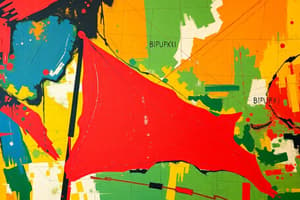Podcast
Questions and Answers
What is one of the main causes of the independence movement in the Americas?
What is one of the main causes of the independence movement in the Americas?
- Decline of agricultural production
- Partnership with Spanish crown
- Interest in political freedom by criollos (correct)
- Desire for land ownership
The Consejo de Indias was established in America.
The Consejo de Indias was established in America.
False (B)
Who is known as 'El Libertador'?
Who is known as 'El Libertador'?
Simon Bolivar
The declaration of independence was issued on ______.
The declaration of independence was issued on ______.
Match the following figures with their contributions:
Match the following figures with their contributions:
Which event marked the final proclamation of independence?
Which event marked the final proclamation of independence?
The Spanish crown increased taxes in America to support local independence movements.
The Spanish crown increased taxes in America to support local independence movements.
What were two consequences of the independence movement?
What were two consequences of the independence movement?
The battle led by Viceroy Juan Samano aimed to ______ the American territory.
The battle led by Viceroy Juan Samano aimed to ______ the American territory.
Flashcards are hidden until you start studying
Study Notes
Independence Era
- Colonial people sought freedom from Spanish rule due to political oppression and discontent.
- Key causes included the desire for political freedom by criollos, increased taxes, and constant abuses by the Spanish crown.
- Declaration of Independence was proclaimed on July 20, 1810.
- Significant battles include Pantano de Vargas on July 25, 1819, and Batalla de Boyacá on August 25, 1819.
- The Congress of Cúcuta convened on August 30, 1821, marking a crucial political development in the independence process.
- Independence resulted in local government autonomy, improved resource administration, and the establishment of democratic freedoms.
Consejo de Indias vs. Real Audiencia
- Consejo de Indias originated in Spain, while Real Audiencia was established in the Americas.
- Both were integral to colonial administration and created by the Spanish crown, serving to manage and govern colonial territories.
Key Figures
- Simón Bolívar, known as "El Libertador," was born in Venezuela and played a pivotal role in independence campaigns.
- Camilo Torres, referred to as "El Verbo de la Revolución," authored "El Memorial de Agravios" advocating for rights.
- Antonio Nariño, called "El Precursor de la Independencia," contributed to the foundation of human rights in the region.
Timeline of Independence Events
- King Philip V of Spain increased taxes in the Americas, igniting discontent.
- In 1781, José Antonio Galán initiated "La Rebelión de los Comuneros," concluding in 1782.
- The cry for independence, "El Grito de Independencia," was declared on July 20, 1810.
- King sent military forces, led by Viceroy Juan Samano, to suppress the independence movement.
- Simón Bolívar launched his campaign for independence, becoming a central figure in the struggle.
- Independence was officially proclaimed following the victory at Batalla de Boyacá on August 7, 1819.
Studying That Suits You
Use AI to generate personalized quizzes and flashcards to suit your learning preferences.



